Mom in my living room
on moving a grand piano
Two years ago I went to visit my parents. They were elderly, but still living in their own home and taking care of themselves with minor help from my brothers. Daddy still drove them to the grocery store and all their appointments. I was in the middle of a very busy time of life caring for my mother-in-law and just beginning to build our forever home, Ben was starting a new job . . . we had a lot going on.
But I was becoming more mindful that we don’t get forever with our parents, and no matter how busy life was, I needed to visit more. So one day I drove up in the morning, intending to stay a couple of hours and drive back home all in one day.
There we were, Mom, Daddy, and me, sitting in their quiet living room talking about all kinds of things, when Mom brought up the subject we children of older parents dread. She blurted out, “What do you want in this house after we’re gone?”
Thinking I could divert from the topic with a little humor, I asked, “Are you going somewhere?” and she backpedaled a little, saying, “Well, not yet, but it’s good to have an idea of what we’ll do with things when the time comes.”
I rolled my eyes and replied, “We don’t need to deal with this now. You’re both fine.”
How naïve of me.
Mom persisted. So I waved my hand and said flippantly, “Okay, I’ll take the piano.” It was the most outlandish thing I could think of in the moment, but both Mom and Daddy pounced on it.
“Now listen, you have to have a humidifier so the wood doesn’t dry out or the sounding board will crack. You should have a hygrometer near it. And it needs to be tuned every six months.”
“I never let children play with toys on it. And make them wash their sticky fingers first. And don’t let anyone set a drink on it.”
“If you have wood floors, it sounds better if you put a rug under it.”
I halfheartedly listened to all of this information while inwardly sighing and thinking, “Why do old people do this? So much angst over nothing.”


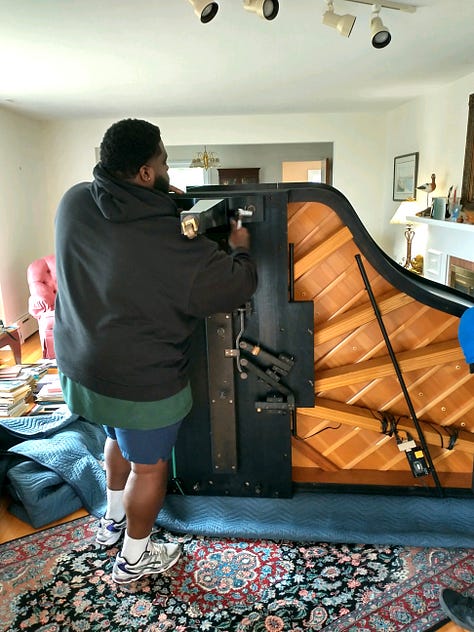
My mother has been a pianist since she was a little child. As soon as she could sit at a piano, her parents payed for lessons. She played in recitals. She played at church. She played everywhere there was a keyboard. When she was sixteen years old, my grandfather, a farmer, bought her an upright Steinway, probably the nicest thing he’d ever purchased beyond a couple of Allis Chalmers tractors. My daughter has that piano today.
When I was a kid, we had an old Estey grand. My mother called it a “parlor grand,” which was slightly bigger than a baby grand but smaller than a concert grand. That’s the piano I learned on and that I remember always having in our home. After I got married and Mom and Daddy retired to the Eastern Shore of Maryland, they sold the old Estey and bought a Yamaha grand, but Mom never really loved the sound of it. She said the bass was shallow.
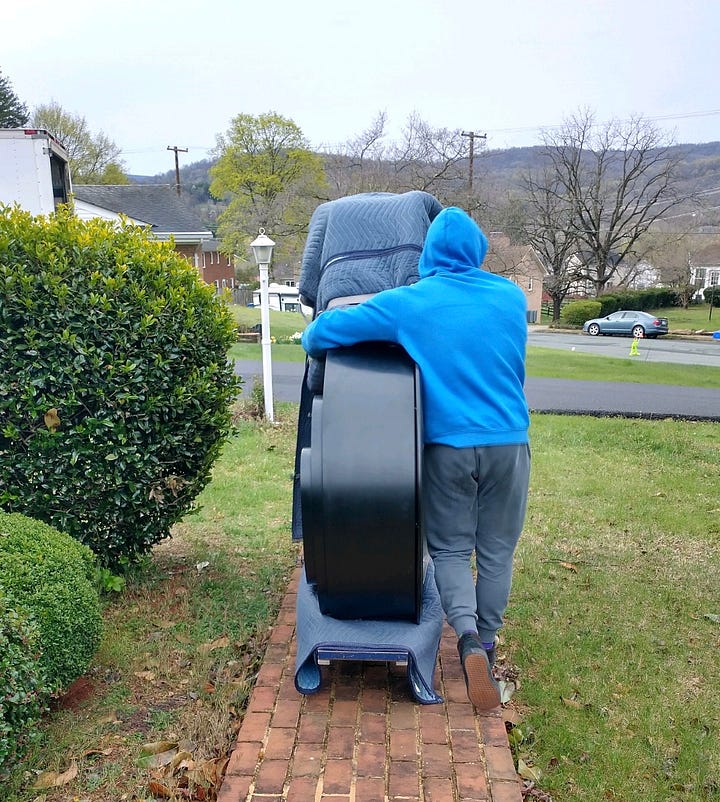
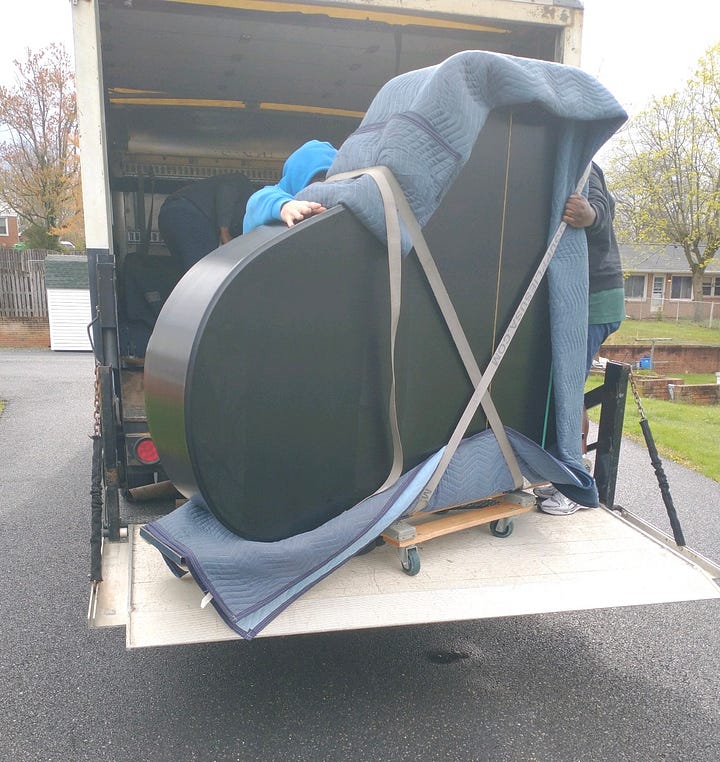
Then they moved to northwest Virginia to be near my brother in their “old age,” and that’s when they bought the Kawai. My mother fell in love with the rich, deep tone and easy action of the keys, and they bought a house that was perfect for it—one with a huge living room.
A piano has always been a fixture in my life. There was literally never a time we didn’t own one, and my first 21 years were filled with the sound of my mother making music every day. No matter how busy she was, she would always find time to sit down and play, even if it was just one song. She played hymns and patriotic music and show tunes and popular songs and Debussy and Brahms and Mozart. She had talent, yes, but there was more than that.
Music is in my mother’s soul. She lives and breathes it. Emotions flow through her fingers on the keys. She worships God in music. Music is how she sees the world and how she speaks to it. When she is playing, she is not present with you; she’s in another world. It is not just a learned skill; it is a gift to her and from her. Music is who she is.
She was a church organist for decades. I remember going to church with her as a little girl and sitting in the corner of the front pew close to the organ, holding the red Methodist hymnal that was almost too heavy for me and which I could not yet read. She would come and sit next to me during the sermon, then go back to the organ to play the final hymn. When I was old enough, I began singing in the choir with my grandmother and aunt, Mom still being the organist. If there was music happening, my mother was part of it.
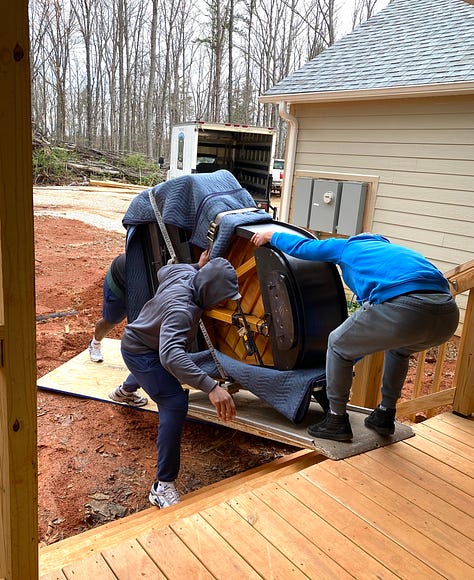
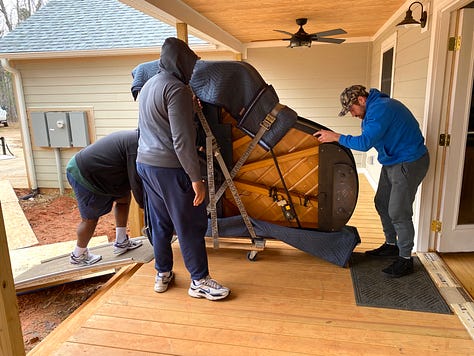
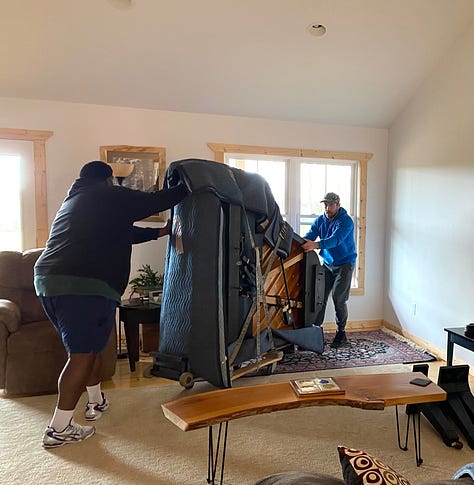
Somehow two years flew by and so much changed so quickly we didn’t want to admit it. We tried not to notice the difficulties my parents began having. We lived in denial, wanting them to stay the same even as we kids grew older.
Then Daddy had a stroke last August and the downhill slide picked up steam. We did everything we knew to do, chose the best care we could find, gladly ran ourselves ragged taking care of everything. It was not enough.
Finally, when we were convinced there was no other option, we suggested assisted living. Mom and Daddy agreed and we moved them into their new apartment at the beginning of December. This was the reprieve we wanted for them: round-the-clock care for every need, safety, rest. Finally the work of survival was not on their shoulders and we all breathed a sigh of relief.
Daddy lived 28 days.
Twenty-eight lightning-fast mornings and afternoons and evenings, every one of them spent adjusting to all the newness, finding their way around their new home, meals in a common dining room, people coming in to help with daily tasks. Daddy wandered around the building investigating and purposely ditched the walker they made him use but he hated.
In all that time, Mom did not play a piano. She didn’t like the one they had in the lobby; she said the action was way too hard and she didn’t want an audience. Music had always been her private release.
Finally, a few weeks (months?) after Daddy was gone, Mom went back to church as the pianist. She was overjoyed to be there and the church was thrilled to have her back. We talked about buying an upright piano she liked and putting it in the sunroom just down the hall from her apartment so she could play whenever she wanted to, with fewer people watching.
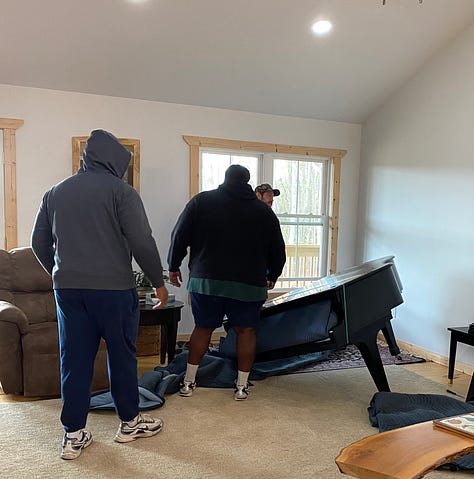
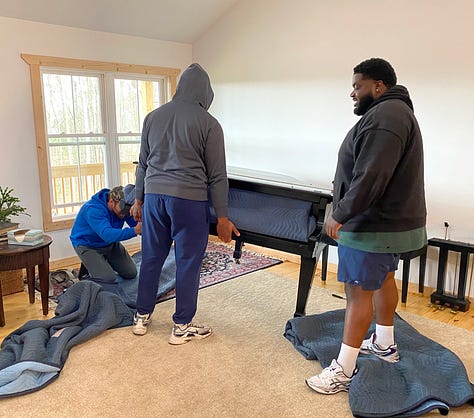

The time came to start emptying the house so it could be sold. That meant moving the piano. Two days before it was scheduled, I suddenly had the thought that we needed to get Mom over there to play her beloved piano one last time. I made a special trip, picked her up, and off we went. She rounded the corner to the living room and said very quietly, “There it is,” as if she were seeing a long-lost friend. Indeed she was. Her relationship with this instrument is deep and wide and so lovely. Her piano is part of her, like an arm or a leg—or a heart.
I helped her get situated on the bench and before I took two steps back, her hands were caressing the keys and the beautiful tune of “Amazing Grace” filled the house. Tears came immediately—for me, not for her. For her it was a joyous reunion. It reminded me of those military homecoming videos we see where the person in uniform is supremely happy and those of us watching just sob.
She played for two hours, flipping pages in her hymnal, playing the songs she’d learned as a little girl, saying goodbye to this mass of polished wood and ivory and ebony and steel strings. When she was satisfied she’d said all she wanted to say, I took her home. She remarked several times that “this was a great idea.”
I cannot stop crying.
Mom’s piano looks beautiful in my living room and I tear up each time I stop to look at it. I am so grateful to have it, this part of my mother that will always live in my house. But part of me feels like it doesn’t belong here. She is still alive and well and able to enjoy making music. Why do I have it already? It feels like I’ve taken something from her, even though she is happy to know it is here and safe in my hands. Wasn’t it just two years ago I rolled my eyes and flippantly said, “Okay, I’ll take the piano”? How did we get here so quickly?
As the children sing in Sunday school, “Be careful, little mouth, what you say.”



What a beautiful, elegant tribute to your mom. I'm crying too.